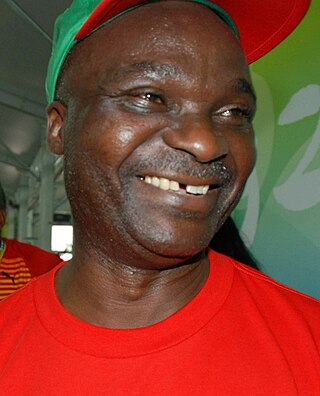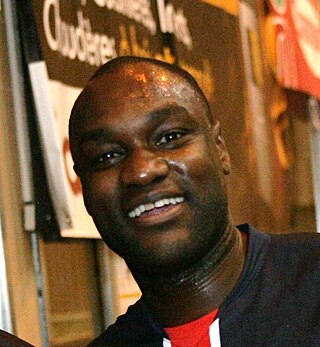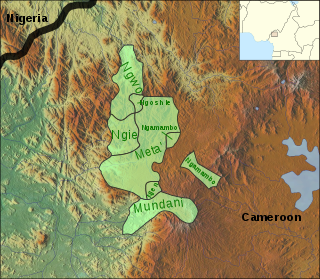Related Research Articles

Cameroon, officially the Republic of Cameroon, is a country in Central Africa. It shares boundaries with Nigeria to the west and north, Chad to the northeast, the Central African Republic to the east, and Equatorial Guinea, Gabon, and the Republic of the Congo to the south. Its coastline lies on the Bight of Biafra, part of the Gulf of Guinea, and the Atlantic Ocean. Due to its strategic position at the crossroads between West Africa and Central Africa, it has been categorized as being in both camps. Cameroon's population of nearly 31 million people speak 250 native languages, in addition to the national tongues of English and French, or both. Early inhabitants of the territory included the Sao civilisation around Lake Chad and the Baka hunter-gatherers in the southeastern rainforest. Portuguese explorers reached the coast in the 15th century and named the area Rio dos Camarões, which became Cameroon in English. Fulani soldiers founded the Adamawa Emirate in the north in the 19th century, and various ethnic groups of the west and northwest established powerful chiefdoms and fondoms.
At the crossroads of West Africa and Central Africa, the territory of what is now Cameroon has seen human habitation since some time in the Middle Paleolithic, likely no later than 130,000 years ago. The earliest discovered archaeological evidence of humans dates from around 30,000 years ago at Shum Laka. The Bamenda highlands in western Cameroon near the border with Nigeria are the most likely origin for the Bantu peoples, whose language and culture came to dominate most of central and southern Africa between 1000 BCE and 1000 CE.

Yaoundé is the capital of Cameroon and, with a population of more than 2.8 million, the second-largest city in the country after the port city Douala. It lies in the Centre Region of the nation at an elevation of about 750 metres (2,500 ft) above sea level.

British Cameroons or British Cameroon was a British mandate territory in British West Africa, formed of the Northern Cameroons and Southern Cameroons. Today, the Northern Cameroons forms parts of the Borno, Adamawa and Taraba states of Nigeria, while the Southern Cameroons forms part of the Northwest and Southwest regions of Cameroon.

Paul Biya is a Cameroonian politician who is the second president of Cameroon since 1982, having previously been the fifth prime minister from 1975 to 1982. As of 2025, he is the second-longest-ruling president in Africa and the longest consecutively serving current non-royal national leader in the world and the oldest head of state in the world.

Albert Roger Miller, known as Roger Milla, is a Cameroonian former professional footballer who played as a forward. He was one of the first African players to be a major star on the international stage. He played in three World Cups for the Cameroon national team.

The Republic of Cameroon is divided into ten regions.

Kamerun was an African colony of the German Empire from 1884 to 1916 in the region of today's Republic of Cameroon. Kamerun also included northern parts of Gabon and the Congo with western parts of the Central African Republic, southwestern parts of Chad and far northeastern parts of Nigeria.

Ambazonia, alternatively the Federal Republic of Ambazonia or State of Ambazonia, is a political entity proclaimed by Anglophone separatists who are seeking independence from Cameroon. The separatists claim that Ambazonia should consist of the Northwest Region and Southwest Region of Cameroon. Since 2017, Ambazonian rebels have engaged in armed conflict with the Cameroonian military, in what is known as the Anglophone Crisis, and have attempted to set up governments-in-exile, and supportive militias have exerted control over parts of the claimed territory. No country has recognized Ambazonia's existence as of 2025.

The Cameroon national football team, also known as the Indomitable Lions, represents Cameroon in men's international football. It is controlled by the Fédération Camerounaise de Football, a member of FIFA and its African confederation CAF.

Henri Patrick Mboma Dem is a Cameroonian former professional footballer who played as a striker. He is the fourth all-time top goal-scorer for the Cameroon national team.

The Cameroon national women's football team, also known as the Indomitable Lionesses, is the national team of Cameroon and is controlled by the Cameroon Football Association. They finished second in the 1991, 2004, 2014, and 2016 Africa Women Cup of Nations, participated in the 2012 Olympic Games and have competed in their first ever FIFA Women's World Cup in 2015.

Cameroon is home to at least 250 languages, with some accounts reporting around 600. These include 55 Afro-Asiatic languages, two Nilo-Saharan languages, four Ubangian languages, and 169 Niger–Congo languages. This latter group comprises one Senegambian language (Fulfulde), 28 Adamawa languages, and 142 Benue–Congo languages . French and English are official languages, a heritage of Cameroon's colonial past as a colony of both France and the United Kingdom from 1916 to 1961. Eight out of the ten regions of Cameroon are primarily francophone and two are anglophone. The official percentage of French and English speakers is estimated by the Presidency of Cameroon to be 70% and 30% respectively.

Douala is the largest city in Cameroon and its economic capital. It is also the capital of Cameroon's Littoral Region. It was home to Central Africa's largest port, now being replaced by Kribi port. It has the country’s major international airport, Douala International Airport (DLA). It is the commercial and economic capital of Cameroon and the entire CEMAC region comprising Gabon, Congo, Chad, Equatorial Guinea, Central African Republic and Cameroon. Consequently, it handles most of the country's major exports, such as oil, cocoa and coffee, timber, metals and fruits. As of 2023, the city and its surrounding area had an estimated population of 5,066,000. The city sits on the estuary of Wouri River and its climate is tropical.

The Momo languages are a group of Grassfields languages spoken in the Western High Plateau of Cameroon.

The Cameroonian Football Federation is the governing body of football in Cameroon. It is known as FECAFOOT.

French Cameroon, also known as the French Cameroons, was a French mandate territory in Central Africa. It now forms part of the independent country of Cameroon.

Visitors to Cameroon must obtain an e-Visa unless they come from one of the visa exempt countries.
Miss Cameroon or Miss Cameroun is a national Beauty pageant in Cameroon where the winners traditionally go to Miss Universe and Miss World. The current Miss Cameroon 2024 is Noura Njikam of Centre. She will represent Cameroon at Miss Universe 2024 pageant in Mexico earlier this year.

The Anglophone Crisis, also known as the Ambazonia War, is an ongoing armed conflict in the English-speaking Northwest and Southwest regions of Cameroon, between the Cameroonian government and Ambazonian separatist groups, part of the long-standing Anglophone problem. Following the suppression of 2016–17 protests by Cameroonian authorities, separatists in the Anglophone regions launched a guerrilla campaign and later proclaimed independence. Within two months, the government of Cameroon declared war on the separatists and sent its army into the Anglophone regions.
References
- ↑ Ngoshie at Ethnologue (18th ed., 2015) (subscription required)